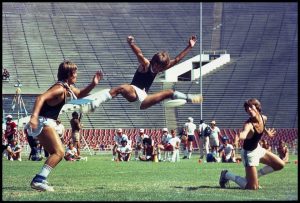Podcast: Play in new window | Download
 In this episode, we continue our conversation with Allen Elliot and Donnie Rhodes.
In this episode, we continue our conversation with Allen Elliot and Donnie Rhodes.
- Allen Elliott gives us the backstory of the semi’s at the 1981 Rose Bowl. 16 teams experimented with “Pick Your Poison” to finalize the pools. The strategy was to avoid the Coloradicals. Was Bill Wright was actually trying to pull a fast one?
- Per Donnie, things were much more serious & competitive then, “Winning was life, freestyle was not a pastime, not a hobby, it was our livelihood.”
- Donny shares his philosophy on the evolution of freestyle. In his opinion, freestyle has veered away from what makes it beautiful, which is the mere flight of the frisbee and the kinesthetic awareness it creates.
- There is also talk of competitive freestyle needing more experimentation. Hmm, that seems to be a common theme. Fortunately events like Frisbeer, Paganello, and Potlatch are doing just that.



First of all, great podcast — Love to hear the crusty ones insider knowledge of the old days.
Couple of thoughts…
On ‘how to attract a crowd’:
1) more gymnastic. People glom on to sports that give ’em ‘the fear factor’. Bigger air, bigger risk, more athletic. If someone were to find a real gymnast who wanted to do freestyle, it would probably take the sport in a very big new direction.
2) better timing. Its all well and good to do a bunch of difficult moves, that only insiders can tell is hard. But the human brain responds basically automatically to elegance and flow, and you did see this more, because there were fewer possibilities, in early players, but that doesn’t mean there isn’t a next level. Better form would be a subset of this as well.
3) more ‘Mind=Blown’ quality. I remember watching kray at the Hampshire College gym many moons ago, and he did some combo that my brain literally couldn’t conceptualize. He moved, combined things really, in ways it had never even occurred to me were possible. Not so much ‘difficult frisbee manipulation, but unprecedented ways of going from one thing to the next. Of course Kray has the timing/elegance/flow/form thing in spades too, so it was fast, and elegant…
In general, if one is interested in attracting interest, I think too much attention is paid to ‘how hard a move is to do’, and not enough emphasis on the human doing it. There is tremendous disc manipulation technology these days, truly amazing, but a long standing trend of de-emphasizing the human body aspect of it all. The frisbee should provide counter-point to what the human is doing, not the other way around. The audience doesn’t care what the frisbee does, they care what the people do.
On ‘Tournaments are what we do’
This has been a particular sticking point for me, for a long time, and I’ve thought about it a lot. I didn’t get into freestyle from a competitive, sporty, angle. I was doing karate and meditating, and that angle has always been the way I’ve related to it. As a non-competitor, and mid level player, I’ve found it hard to have a meaningful role in the extremely competition focused world of freestyle. I say extremely because in no other sport in which I’ve participated, again at an amateur level, is there anywhere near the emphasis on tournament. Even with the frisbee world, while its certainly true that golf and ultimate have lots of tournaments, and lots of players focused on competition, there are larger numbers of people who play these sports without ever a though of entering a tournament. And it is precisely the non-tournament players who become the audience at the tournaments, who provide the interest level that grows the sport. My two cents, is that if freestyle were thought of more as ‘mind/body flow training’ and not ‘I’m the best player in the world’, one would attract a different and larger crowd of people. Most people aren’t going to win the tournament, and if you want to keep them interested, there has to be something in it for them. And I tend to think that frisbee as mind/body merging training, meditative attention, is far superior to things like tai-chi, (but not for ‘subtle body energy work’, obviously) and with a disciplined concerted focus on this idea, over time, could rival things like karate, offering as it does a challenge to fluidity, and responsiveness, and detail orientation, that martial arts rather lack.
Mike
Thank you for your thoughts on other ways to embrace and share freestyle beyond competition. One of the reasons I continue to go to competitions is so I can meet and jam with all my friends. It would be fun to have other outlets for Freestyle that are not competitive. That’s what I love about our beach weekend events.
There were several “Jam Camp” events as well. I attended the ones in California. We taught many people of all skills and ages how to Freestyle. People loved it. Another great example of Freestyle without the competition.
I also like your perspective about Freestyle as a form of meditation. For me, that is very much a part of why I jam. It gets me very in-the-moment”.
I more and more regret not going to events, because I love all the folks I know, and those I don’t, and miss seeing them. I’ve always had some money issues, and right now, have them in spades. If I could figure out how to have money, and time, I’d be at everything.
Pingback: Episode 87: John Kirkland Keeps Searching for His Passion - FrisbeeGuru